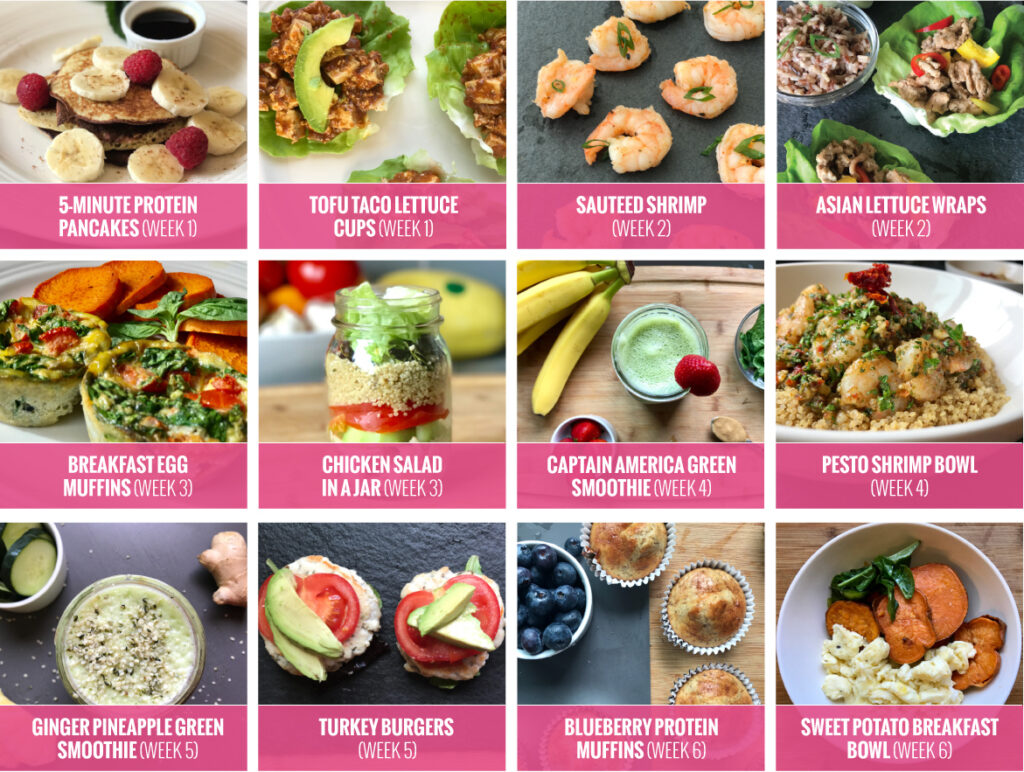This week in the Rock Your Life Community I got a great question from one of my members, MaryLou Rea.

No sooner had I answered her than I suddenly got a similar question on the blog, my fan page, on my Instagram, and even my friend Barb was asking me this question! While I had talked about this on live coaching calls before, I hadn’t put it together in one place for you as a reference until now.
If you’ve been wondering something similar, today I’ll take you through the top five reasons why you aren’t seeing the results you are after even though you are showing up and doing the work.
1: Overtraining
Overtraining is a factor in a lot of chronic fatigue, it’s the reason people get injured when they shouldn’t, AND it’s a culprit in why you don’t see results faster.
When you are able to give 100% to the workout you are doing, you will get more out of it. So it follows that you want to be ABLE to give 100% by being fully recovered from the last one.
During your workout, you’re actually creating inflammation in the muscle tissue and tearing it down. In a strong, healthy person (one who is well rested, well nourished and injury free), that is great, because that tissue grows back stronger than ever AFTER your workout WHEN you REST.
Exercising too much can create a state of chronic inflammation in the body, setting you up for fatigue, lack of weight loss (your system is stressed out, which makes it hold onto body fat) and you’re more likely to get injured on muscle tissue that hasn’t fully recovered.

This is why you don’t want to overtrain, or exercise with high intensity every day.
Be aware of the type of workouts you’re doing daily, and mindful of your energy levels. We’re all in different places, with varying goals – so let your fitness level and the way your body feels after you workout be your guide.
This becomes essential in perimenopause and postmenopause, as lower levels of hormones mean it takes our bodies a little longer to recover (read my training guides for balanced training in perimenopause and balanced training postmenopause here).
You’ll need to experiment to find out your sweet spot, but even when you do it can change from week to week, either because you didn’t get a great night’s rest, your monthly cycle, additional stress, or one of your workouts was just more taxing than usual and you need more recovery time.
I get the desire to “move every day” and that’s a really healthy attitude. But it doesn’t also have to mean “no days off” when it comes to training. Moving every day can include your actual dedicated workouts AND activities like walks, hikes or casual bike rides, shoveling snow, raking leaves, gardening, or other activities where you’re moving, but not for a “workout.” I like to call those “active recovery days” (here’s 10 ideas for those days for you).
In most of my workout challenges, we offer you 2 rest days, one that is dedicated to mobility or stretching, and one that is completely off. We also offer customizes programming for our Rockstars in perimenopause and postmenopause to ensure you’ve got the right balance of training to recovery for your life stage. You could use that as an active recovery day and do something fun, but for the best results with your training your body needs the recovery time from the workouts.
As you get stronger, your body will crave more intensity as it needs a stronger stimulus to adapt to. However that’s something you want to build into the days you workout, either by making your workouts longer in duration, or using more resistance. More intensity does not mean more workout days – you’re still working at your body’s capacity (even if it’s increased) and you still need recovery days so you can hit your next workout with 100%.
2: Skipping Meals
One of the MOST important parts to seeing results is fueling your body often, and getting in tune with your hunger and fullness cues.
As women, we do better in a fed state vs a fasted state. Researcher, scientist, and famous for her TED Talk “Women are Not Small Men,” Dr. Stacy Sims outlines this beautifully in a recent article about why Intermittent Fasting isn’t ideal for women:
“You may hear about men getting cognitive focus and clarity of mind when they are in a fasted state, and this is because we know specifically that the parasympathetic response in men is one that is very strong.
But in women, it’s not a parasympathetic response. It’s a sympathetic response to not having enough calories. In a fasted state, women are anxious, they have brain fog, they get a little bit of depression and an elevated heart rate, and it’s because they’re in such a high sympathetic drive.
We also know that in women, there’s no improvement in blood glucose control, where as in men there is. We also know that the autophagy that is so well-documented in intermittent fasting, is very minimal in women, but it has a massive effect in men.
The biggest thing about IF is it signals an increase in visceral fat in women. (the fat around the essential organs, the protective fat that’s really hard to mobilize and increases cardiovascular risk.)”

And skipping meals also sets you up for cravings -because your body just needs energy, and reaching for the fastest source of it, sugar, is a handy way to get some. But that has consequences, as you know.
Insulin helps your body regulate blood sugar levels by guiding your cells to accept the glucose from the food you just ate. When your cells absorb that fuel, you get energy. A skipped meal can cause blood sugar levels to drop, which can throw off your insulin system and over time, create insulin resistance. Once your body and brain have stopped “listening” to insulin’s signals and stop absorbing glucose, you end up with excess glucose floating around in your bloodstream which your body (in)conveniently packages up as fat.
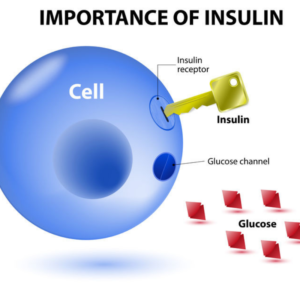
Insulin resistance: Insulin’s job is to help bring your blood sugar levels back to equilibrium by opening up the cells to receive glucose. People who are insulin resistant produce insulin, but their cells have stopped responding to it.
The pancreas, which makes insulin, turns up the volume, producing more and more insulin in response to the elevated blood sugar, but the cells still do not take it up and blood sugar continues to rise.
Prolonged elevated blood sugar can damage organs and nerves, and is associated with obesity, type 2 diabetes, high cholesterol and high blood pressure.
Insulin Sensitivity: Insulin sensitivity refers to how responsive your cells are to insulin – so how much insulin needs to be produced in order to shuttle the amount of glucose in the bloodstream.
You are insulin sensitive if a small amount of insulin is needed to deposit the glucose you’ve taken in.
Improving insulin sensitivity can help you reduce insulin resistance, and reduce the risk of many diseases, and ensures your body converts the energy from your food in the most efficient manner (including supporting your muscle).
The more insulin sensitive you are, the more readily your nutrients will be partitioned to the muscle tissue to be stored as glycogen (rather than fat storage). As we get into our perimenopause years and then into postmenopause, we become even more sensitive to our insulin response as our estrogen levels decline. Paying attention to regular meals with fiber-rich carbs, plenty of protein, and healthy fat and greens is essential.
You see, your body likes to be in a state of constant equilibrium-that’s what hunger is for: to remind you to eat so you can maintain a steady energy state. Skipping meals will make you feel tired, lessen your ability to focus, create cravings, and make you hold onto your body fat.
It’s totally fine if you eat 5 times a day, 3 times a day or within a time window. Just be sure to eat ENOUGH food daily so that you feel satisfied and full, and ensure its from nutrient dense sources so you get the benefits and reap the rewards.
3: Not eating enough nutrient-dense food
Every time you eat, you’re creating the foundation and tissue that make up the actual shape and structure of your body – and every time you exercise, you’re simply putting the finishing touches on the beautiful physique you’ve sculpted with what you put in your mouth.
How your muscle uses the food you eat for energy and growth (excerpt from How Muscle Works)
The foods we eat in the form of carbohydrates, fat and protein are all potential fuel sources for the body’s energy needs. They follow different metabolic pathways that provide us with immediate energy or stored energy for later use, and our muscle cells access them in different ways.
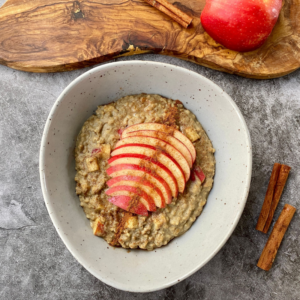
Carbohydrates are broken down into glucose, which can be used for immediate energy, or sent to the liver and muscles and stored as glycogen. Your body has a limit to how much glycogen it can store in both places.
The liver has a set capacity, and muscle tissue can store a set amount that depends on the amount of muscle you have. If you take in more than you can use for energy and more than you can store in your muscles and liver, it will be stored as body fat.
During exercise, there are several ways your muscles get access to fuel:
- Stored muscle glycogen is converted back into glucose fueling muscle contraction.
- The liver converts its stored glycogen back into glucose, stabilizing the blood sugar, and also making itself available for the muscle tissue to use for energy.
- Stored body fat (in our adipose tissue) is broken down into fatty acids that are transported by the blood to fuel the muscles – but this is a slower process compared to the way the body uses carbohydrates (glycogen) for fuel.
Fat helps fuel your muscles for low to moderate intensity activity (in the presence of oxygen availability), so the daily energy you expend doing your regular activities, and any exercise performed at or below 65% of your aerobic capacity. Carbohydrates fuel higher intensity activity, when your body can’t process enough oxygen to meet its needs (see 2 in section IV).
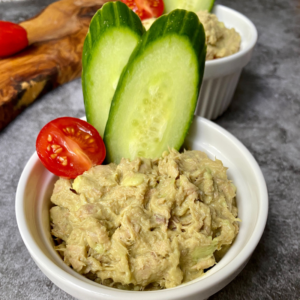
Unlike fat and carbohydrates our body doesn’t have a “storage reserve” for protein. This is one of the reasons it’s a good idea to include it in all of your meals throughout the day. Protein is primarily used to build, repair and maintain body tissue (in a process called protein synthesis) and make enzymes and hormones. It serves only a tiny percentage of the body’s energy needs.
The protein you eat is key in supporting muscle tissue repair and development in a process called muscle protein synthesis (MPS).
Protein is the main building block of muscle tissue. When you eat foods that contain protein, they’re digested into their amino acids which are transported to body tissues and built into tissue proteins. Protein synthesis is the process of building new proteins, which happens in all the body’s organs.
Muscle protein synthesis (MPS) is the process where your body builds specific muscle proteins from amino acids, and this contributes to muscle size.
Muscle protein synthesis can be increased by including protein with each main meal, and by including protein after you exercise – after the “tear down” has occurred. The amino acids from the protein you ingest will be shuttled to your muscles, replacing any lost during exercise.

The contractions your muscles make decrease muscle protein synthesis during a workout, but it rebounds post-exercise especially when protein or amino acids are added. Studies show that between 20-40 grams is the best amount to support this process, and that eating protein throughout the day in your meals is also a contributing factor.
If you’re in your cycling years, try starting out with 20-30 grams of protein per meal (assuming 3 main meals per day). If you’re over 40, you may need a little more than that as our body doesn’t absorb the amino acids as easily as we age. You can aim for more like 30-40 grams per meal (assuming 3 meals per day) as a baseline, or simply add a protein shake in the mix to help get your numbers up overall.
Like we were talking about above, your body can store the glucose you don’t need for immediate energy in 3 places, your liver glycogen, your muscle glycogen, and/or your fat cells.
“Nutrient partitioning” describes which of these 3 paths will be taken, and that has a lot to do with your current amount of body fat, muscle mass, and hormone levels – particularly insulin.
If you are insulin resistant, fat storage is prioritized. If you have good insulin sensitivity, muscle and liver storage is prioritized, and you get the bonus benefit of it aiding your amino acids entering the muscle tissue as well (muscle protein synthesis).
Improve your insulin sensitivity by eating whole foods, and getting regular exercise.
Constantly eating high sugar foods (or eating in excess of what your body can process) triggers the insulin response over and over, leading to insulin resistance. Doing the opposite of that, eating low-glycemic (low sugar) foods – in the form of fiber rich whole food carbohydrates is a great way to improve your insulin sensitivity.
A slower, steadier influx of glucose (rather than a huge spike) gives insulin a chance to do its job at the right pace. Including fiber helps us feel more full – meaning we won’t be as likely to overeat. Dietary fat has a similar effect, slowing down nutrient absorption and making us feel more full and satisfied so we’re not as likely to overeat. Plus, fat is very nutrient dense, giving us plenty of energy in a smaller package.
Cooking your own foods so you know exactly what’s going into your body is an ideal way to support your muscle tissue. It’s far easier to overeat when you’re eating pre made foods from refined flour and sugar like breads, cereals, sweets and desserts – they don’t contain as much fiber as their original ingredients did, and constant reliance on them will just keep on spiking your insulin, leading to more body fat storage and insulin resistance.
Insulin also has the added benefit of decreasing muscle protein breakdown (MPB). In the absence of insulin, or in the case of insulin resistance muscle catabolism (breakdown) occurs.
Your brain needs a constant, steady supply of glucose to function optimally, and MPB allows the body to gain access to amino acids that can be converted into glucose when there aren’t enough available from your other stores. Muscle protein breakdown can also occur when we don’t eat enough food (or too few carbohydrates) and glycogen reserves are depleted. The body needs fuel, so skeletal muscle is broken down and converted to glucose.
Fat, protein and carbohydrates all provide the nutrients your body needs for your workouts, and eating them throughout the day from whole food sources will provide you with plenty of fuel for both daily activities and muscle growth. Together these nutrients support healthy muscle tissue before, and after a workout.

So many people are walking around with nutrient deficiencies masquerading as CRAVINGS, that could be resolved by eating real foods and rotating their greens (read my 5-step food prep and recipes guide for a 3-day plan and recipes to try.)
A great way to get started is to think about 2-3 breakfast options you like (for me it’s eggs, oatmeal and smoothies), your favorite entrees that could double as dinner or lunch – and I just think of what proteins I want to base them on, then what carbs, and finally what fats would work well (as simple as olive oil or hemp seeds or avocado).
I fill that in with a couple snacks like home made pumpkin protein muffins or an easy to make trail mix, a couple staple sides I would want on hand daily like a big mixed greens salad and some rice, quinoa or pre-made easy to grab sweet potato chunks – and make my list and pick my recipes around that.
For so many reasons, it is essential that you take your eating just as seriously as you take your workouts.
While it’s easy to get focused on our workouts and harder to get focused on nutrition, remember that how you eat is so much more important to your external (and internal) results. There is no exercise plan in the world that can out-train poor nutrition.
4: Not getting enough sleep
Not getting enough sleep is such a SNEAKY way that we can sabotage our results. A typical day for a lot of people is to get up early, prioritize their workout, skip breakfast, have a few drinks after work, and then after a long day stay up late to cram in just a little extra “me time.”
Unfortunately, this is like a perfect storm for metabolic meltdown, and the best way to keep padding your waistline.
We already talked about what happens when you skip meals, but skipping sleep is terrible for our health. It can also lead to the development of insulin resistance, and type 2 diabetes, obesity, heart disease and high blood pressure.
Getting less than 6 hours of sleep a night can lead to weight gain and increased cravings for unhealthy foods. Lack of sleep can lead to the development of many chronic diseases. It also disrupts important metabolic pathways that are involved in your energy balance and regulation which in turn effects your results.
Many important hormones that are directly related to you seeing your body respond to your workouts and healthy eating are disrupted when sleep quality and quantity are inadequate. Getting enough sleep allows you to perform better, makes you happier, regulates your hormones, reduces stress levels, improves focus, creativity, memory and regulates and reduces inflammation.
Plus, having adequate rest gives you the energy to get to a workout at the end of the day if that’s the only time you can go, get you up and at it first thing in the morning, and help you manage stressful things that may come up throughout the day.
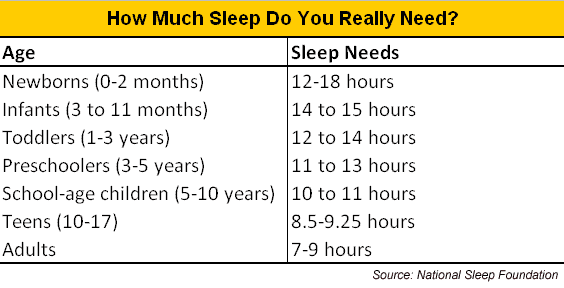
Everyone is different but I agree with the National Sleep Foundation – getting around 7-9 hours is optimal. Some things that help with falling asleep and staying asleep are making sure your environment doesn’t expose you to light as light on your skin signals your body that it’s time to wake up.
You can also use a sleep mask as needed for a really good sound sleep. Begin winding down from computer or phone use an hour or so before you’re planning to sleep and keep in mind that the light from TV’s and electronic devices disturbs your ability to rest.
Read more tips about getting good sleep – and why it matters – right here.
5: Not building stress resilience

Stress raises your levels of a hormone called cortisol in your body. Cortisol, in its normal capacity has important jobs like supporting your sleep-wake cycle, but as it pertains to this discussion it also has the ability to raise blood glucose levels when it is elevated because you’re chronically stressed.
In times of stress our bodies go into “flight or fight mode.” When this happens your body releases adrenaline and cortisol. In the short-term, the adrenaline reduces your hunger levels as your blood flows away from the internal organs to your larger muscles to help you defend yourself. However, once the effects of adrenaline wear off, we are left with cortisol.
This cortisol tells your body it’s time to replenish your food supply but we are also left with excess amounts at the same time. The excess levels of cortisol slows down your metabolism to maintain an adequate supply of glucose in your blood in order to fight off any threat (stress).
Once the stressful event is over and our stress levels fall, our glucose levels remain high and that glucose gets stored as fat. Most notably visceral fat and belly fat. Cortisol also promotes the breakdown of our valuable muscle tissue. And as we enter into perimenopause and postmenopause, lower levels of our hormones make us more susceptible and sensitive to the impact that cortisol can have.
Building practices that actively support more stress resilience can be so beneficial. Simple things like walking outside, being in nature, being present, practicing mindfulness, starting a regular breathing practice or meditation practice, journaling or other activities that ground us can all be really helpful in both reducing our stress and also building our resilience to the stress we face.
After all, we can’t control that life will have its ups and downs and throw things at us unexpectedly! So it’s good to cultivate some tools that help us cope with it when it happens. Just like we train our bodies to be stronger (and that helps us have more power and capability), training our mind and supporting our nervous system give us reserves to call on when we need them too.
LISTEN: 12 Ways to improve your stress resilience
We talk about these topics (and more) in Rock Your Life, my online home workout studio and women’s fitness community!
Come join us and let us support you on your journey of fitness and health – with home workout challenges, workout classes, healthy recipes, and our private support group!
References:
- Adam, Tanja, et all. “Stress, Eating and the Reward System.” Physiology and Behavior. Volume 91, Issue 4. July 24, 2007.Web. https://www.sciencedirect.com/science/article/abs/pii/S0031938407001278
- Andrews, Ryan. “All About Insulin.” Precision Nutrition. Web. https://www.precisionnutrition.com/all-about-insulin
- Bulletproof Staff. “Reverse Insulin Resistance with Intermittent Fasting.” Web. https://blog.bulletproof.com/insulin-resistance/
- Champeneri, Shivam, et all. “Diurnal Salivary Cortisol is Associated With Body Mass Index and Waist Circumference: The Multi-Ethnic Study of Atherosclerosis.” Obesity Research Journal. Volume 21, Issue 1. October 3, 2012. Web. https://www.ncbi.nlm.nih.gov/pmc/articles/PMC3602310/
- Greenberg, Melanie Ph.D. “Why We Gain Weight When We’re Stressed—And How Not To.” Psychology Today. Web. https://www.psychologytoday.com/us/blog/the-mindful-self-express/201308/why-we-gain-weight-when-we-re-stressed-and-how-not
- Koslo, Jennifer. “Research Review: Less sleep, more insulin resistance?” Precision Nutrition. Web. https://www.precisionnutrition.com/sleep-and-insulin-resistance
- Liu, Yun-Zi, et al. “Chronic stress induces steatohepatitis while decreases visceral fat mass in mice.” BMC Gastroenterology. May 24, 2014. Web. https://bmcgastroenterol.biomedcentral.com/articles/10.1186/1471-230X-14-106
- Lv, Wen, et al. “Sleep, food cravings and taste.” Science Direct Journal of Appetite. Volume 125. June 1, 2018. Web. https://www.sciencedirect.com/science/article/pii/S0195666317312345
- Marniemi, Jukka, et.al. “Visceral fat and psychosocial stress in identical twins discordant for obesity.” Journal of Internal Medicine. February 22, 2002. Web. https://onlinelibrary.wiley.com/doi/10.1046/j.1365-2796.2002.00921.x
- Mozaffarian, Dariush, et.al “Changes in Diet and Lifestyle and Long-Term Weight Gain in Women and Men.” The New England Journal of Medicine. June 23, 2001. Web. http://www.nejm.org/doi/full/10.1056/NEJMoa1014296
